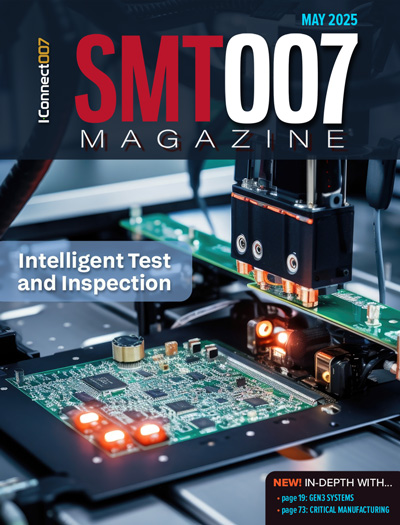-

- News
- Books
Featured Books
- smt007 Magazine
Latest Issues
Current Issue
What's Your Sweet Spot?
Are you in a niche that’s growing or shrinking? Is it time to reassess and refocus? We spotlight companies thriving by redefining or reinforcing their niche. What are their insights?

Moving Forward With Confidence
In this issue, we focus on sales and quoting, workforce training, new IPC leadership in the U.S. and Canada, the effects of tariffs, CFX standards, and much more—all designed to provide perspective as you move through the cloud bank of today's shifting economic market.

Intelligent Test and Inspection
Are you ready to explore the cutting-edge advancements shaping the electronics manufacturing industry? The May 2025 issue of SMT007 Magazine is packed with insights, innovations, and expert perspectives that you won’t want to miss.
- Articles
- Columns
- Links
- Media kit
||| MENU - smt007 Magazine
Fujitsu Develops Technology to Speed Up Quantum Circuit Computation in Quantum Simulator by 200 Times
February 19, 2024 | FujitsuEstimated reading time: 4 minutes
Fujitsu announced the development of a novel technique on a quantum simulator that speeds up quantum-classical hybrid algorithms, which have been proposed as a method for the early use of quantum computers, achieving 200 times the computational speed of previous simulations. For quantum circuit computations using conventional quantum and classical hybrid algorithms, the number of times of quantum circuit computation increases depending on the scale of the problem to be solved. Larger-scale problems that require many qubits, including simulations in the materials and drug discovery fields, may even require several hundred days.
The newly developed technology enables simultaneous processing of a large number of repetitively executed quantum circuit computations distributed among multiple groups. Fujitsu has also devised a way to simplify problems on a large scale with less loss of accuracy by using one of the world's largest-scale quantum simulators (1)it has developed. Fujitsu has made it possible to perform computations on a quantum simulator in just one day, which would take an estimated 200 days to complete with conventional methods. As a result, it is now possible to complete simulations of large-scale quantum computation within a realistic timeframe and to simulate the behavior of larger molecules computed by a hybrid quantum-classical algorithm, leading to algorithm development.
Fujitsu plans to incorporate this technology into its hybrid quantum computing platform to accelerate research into the practical application of quantum computers in various fields, including finance and drug discovery. Additionally, Fujitsu will not only apply this technology to quantum simulators, but also to accelerate quantum circuit computations on actual quantum computers.
Background
Although the development of fault-tolerant quantum computers (FTQC (2) ) is currently progressing worldwide, current quantum computers face many problems, such as the inability to eliminate the effects of noise. At the same time, in order to demonstrate the usefulness of quantum computers ahead of FTQC, practical applications for small and medium-sized quantum computers (Noisy Intermediate-Scale Quantum Computer, NISQ) with noise tolerance of 100 to 1,000 qubits are being studied.
By applying VQE (3), a typical NISQ algorithm, Fujitsu, for example, has developed a quantum simulator for quantum application development (4) and has been working to speed up quantum circuit computation itself. However, in VQE, the number of iterations of quantum circuit computation increases as the size of the problem increases, so it takes a very long time to perform computation, especially for large problems requiring many qubits, and it is estimated that it takes several 100 days for a quantum simulator. Therefore, it was difficult to develop quantum algorithms for practical use.
Outline of the newly developed technology
In response to this problem, Fujitsu has developed a technology that achieves 200 times higher the performance speed of conventional technologies by simultaneously distributing multiple repetitively executed quantum circuit computations and reducing the amount of quantum circuit computations by reducing accuracy degradation.
Distributed concurrency of optimization processes requiring repeated computation of quantum circuits
Quantum-classical hybrid algorithms seek a quantum circuit that provides the lowest energy state, for example, the ground state of a molecule, by alternating between the process of performing quantum circuit computation and the process of optimizing quantum circuit parameters (5) using a classical computer. However, for parameter optimization of quantum circuits by classical computers, it is necessary to prepare a large number of quantum circuits with small changes in parameters, perform quantum circuit computation for all of them sequentially, and derive the optimal parameters from the results. This requires considerable time for computation, especially for larger-scale problems. Increasing the number of nodes simply to speed up circuit computation has conventionally been limited by communication overhead, and new technologies were required.
Focusing on the fact that quantum circuits with small parameter changes can be executed without affecting each other, Fujitsu has developed a distributed processing technology that enables each group to execute different quantum circuits by dividing the computation nodes of the quantum simulator into multiple groups and using RPC (6)technology to submit quantum circuit computation jobs through the network. Using this technology, multiple quantum circuits with different parameters can be simultaneously distributed and calculated, and the computation time can be reduced to 1/70th of the conventional technology.
In addition, since the computation quantity in the quantum-classical hybrid algorithm is proportional to the number of terms in the equation of the problem to be solved, and the number of terms is the fourth power of the number of qubits in the general VQE, the computation quantity increases as the problem scale increases, and the result cannot be obtained in a realistic time. Through simulations of large molecules using 32 qubits of one of the world's largest 40 qubit quantum simulators, Fujitsu has found that the ratio of terms with small coefficients to the total number of terms increases as the scale increases, and that the effect of terms with small coefficients on the final results of calculations is minimal. By taking advantage of this characteristic, Fujitsu was able to achieve both a reduction in the number of terms in the equation and prevention of deterioration in computation accuracy, thereby reducing the quantum circuit computation time by approximately 80%.
By combining these two technologies, Fujitsu was able to demonstrate for the first time in the world that when distributed processing of 1024 compute nodes into 8 groups for a 32 qubit problem, it was possible to achieve a quantum simulation run time of 32 qubits in one day, compared to the previous estimate of 200 days. This is expected to advance the development of quantum algorithms for problems with a large number of qubits and the application of quantum computers to the fields of materials and finance.
Testimonial
"The I-Connect007 team is outstanding—kind, responsive, and a true marketing partner. Their design team created fresh, eye-catching ads, and their editorial support polished our content to let our brand shine. Thank you all! "
Sweeney Ng - CEE PCBSuggested Items
Honeywell Awarded U.S. Government Contracts to Develop Quantum Sensor-Based Navigation Systems
07/21/2025 | HoneywellHoneywell has been selected by the U.S. Department of Defense’s (DOD) Defense Innovation Unit (DIU) to participate in the Transition of Quantum Sensing (TQS) program.
EIFO, the Novo Nordisk Foundation Acquire the World's Most Powerful Quantum Computer
07/17/2025 | PRNewswireThe commercial and geopolitical stakes in quantum technology are immense, and significant technological advances have been made over the past decade.
indie’s LXM-U Laser Powers Next-Gen Quantum Technologies with Ultra-Low Noise Performance
07/14/2025 | indie Semiconductorindie, an automotive solutions innovator, is rapidly gaining industry adoption in its photonics portfolio, with indie’s latest ultra-low noise LXM-U lasers enabling next-generation quantum applications by delivering industry-leading frequency stability and integration flexibility.
Hon Hai Education Foundation Continues to Promote Quantum Education
07/04/2025 | FoxconnHon Hai Education Foundation has long been committed to promoting forward-looking technology education in Taiwan's high schools, and held the "High School Quantum Teacher Training Camp" in Tainan City on July 1.
Xanadu Opens $10M Advanced Photonic Packaging Facility in Ontario
06/25/2025 | PRNewswireXanadu, a world leader in photonic quantum computing, has opened a $10M world-leading advanced photonic packaging facility in Toronto. This facility represents a significant leap in Canada's quantum supply chain resilience and technical capacity.


